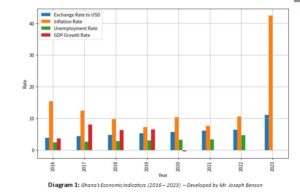“Sε wo werε fi na wosan kofa a, yεnkyiri.” In the Akan language, this proverb means “It is not wrong to go back for that which you have forgotten.” As we delve into the economic challenges that Ghana, a beacon of hope in the African continent, is currently grappling with, this parable rings true. From high inflation rates, unemployment, and a widening budget deficit to a depreciating currency, the nation is in dire need of innovative solutions. At the forefront of these solutions is entrepreneurship education, a potent tool that could serve as a catalyst for economic revival.
Can entrepreneurship education truly be the panacea for Ghana’s economic woes? Or perhaps, could there be other complementary solutions, like digital transformation, that could work in tandem with entrepreneurship education to drive economic recovery?
The Current Economic Crisis in Ghana
Ghana’s economy, once hailed as one of the fastest growing in the world, has been facing a series of challenges in recent years. The nation’s currency, the Cedi, has been on a downward spiral, with the exchange rate to the US dollar increasing from 3.9 in 2016 to 11.15 in 2023.
Inflation in Ghana has been fluctuating, reaching a peak of 15.4% in 2016 and was estimated at 10.6% in 2022. However, by June 2023, the situation significantly worsened with inflation rising to 42.5%, surpassing the central bank’s target of 6% to 10%. The acceleration in overall inflation was largely driven by rising prices for food and beverages, which increased to 54.2% from 51.8% in May. Conversely, non-food inflation moderated to 33.4% from 34.6%. On a monthly basis, consumer prices increased by 3.2% in June, slowing from a 4.8% jump in May, which was the steepest in six months.
Unemployment, particularly among the youth, has also been a concern, with the rate increasing from 2.4% in 2016 to an estimated 4.7% in 2022. The GDP growth rate, although showing resilience, has seen a dip, especially with the -0.4% contraction in 2020 due to the COVID-19 pandemic. These factors have contributed to the economic crisis in Ghana, with the COVID-19 pandemic exacerbating these issues and plunging the nation into a deeper economic quagmire; Ghana sees slower growth and higher inflation in 2023.

As we delve into the economic crisis in Ghana, one might ask, “What could be the potential solution to this crisis?”
The Role of Entrepreneurship Education
Entrepreneurship education has emerged as a potential game-changer in this scenario. By fostering a culture of innovation and self-reliance, it can equip the youth with the skills necessary to create their own employment opportunities. This, in turn, can stimulate economic growth, reduce unemployment, and ultimately alleviate the current economic crisis.
According to a study by the International Journal of Business and Social Science, entrepreneurship education in Ghana has a significant positive effect on students’ entrepreneurial intentions and potential start-up rates. This suggests that entrepreneurship education could be a viable strategy to combat the high youth unemployment rate, which stood at 4.7% in 2022. Moreover, the Global Entrepreneurship Monitor (GEM) report indicates that Ghana has one of the highest entrepreneurship rates in Africa, further emphasizing the potential of entrepreneurship education in economic revival.
In the context of the IMF conundrum, where Ghana is grappling with the need for financial assistance and the associated conditions, entrepreneurship education can play a crucial role by promoting self-reliance and innovation; which can help reduce the country’s dependence on external financial aid. This can be particularly effective in addressing the high inflation rates, which have been driven largely by rising prices for food and beverages. Entrepreneurship education can encourage the development of local businesses, potentially stabilizing the food and beverage sector and contributing to a decrease in inflation.
Entrepreneurship education can counter the depreciating Cedi by promoting innovation, leading to businesses that earn foreign exchange and strengthen the local currency. This approach could help combat the rising exchange rate to the US dollar, which is currently GHC 11.38.
Nonetheless, the question remains, “Can entrepreneurship education alone turn the tide?”
While entrepreneurship education isn’t a complete solution to the economic crisis, it can lessen its effects. By fostering innovation and self-reliance, it contributes to the development of a resilient, sustainable economy, which is vital for Ghana’s economic recovery.
Digital Transformation: A New Frontier for Entrepreneurship
In the face of the current economic crisis, Ghana is also exploring new frontiers for economic revival, with digital transformation emerging as a promising area. Digital transformation, which involves the integration of digital technology into all areas of a business or economy, is fundamentally changing how organizations operate and deliver value to customers. It’s also a cultural change that requires organizations to continually challenge the status quo, experiment, and get comfortable with failure.
Overall, the digital economy in Africa, including Ghana, is projected to reach over $300 billion by 2025, offering significant opportunities for entrepreneurship and innovation. Ghana’s progress in financial inclusion, largely driven by digital financial services, has been substantial. The World Bank’s support for digital projects in Ghana highlights the nation’s dedication to using technology for economic development and better services. Amidst its economic crisis, Ghana could use digital transformation and entrepreneurship education as twin drivers for economic recovery.
Top of Form
The Importance of Effective Governance and Sound Economic Policies
While entrepreneurship education is crucial, it cannot function in a vacuum. Effective governance and sound economic policies are equally important. Policies that encourage investment, ensure fiscal discipline, and promote a conducive business environment are necessary to support the growth of entrepreneurial ventures. According to the World Bank’s Worldwide Governance Indicators (WGI) project, Ghana has made significant strides in areas such as voice and accountability, political stability, government effectiveness, regulatory quality, rule of law, and control of corruption between 1996 and 2014. However, there is still room for improvement. For instance, the World Bank’s Public Private Partnership Project for Ghana aims to improve the legislative, institutional, financial, fiduciary, and technical framework to generate a pipeline of bankable PPP projects. Such initiatives can help create a favorable environment for entrepreneurship and investment, thereby contributing to economic recovery. Furthermore, the World Bank’s Ghana Country Assistance Review emphasizes the need for a strategy prioritizing sustainability, private sector growth, addressing declining agricultural productivity, managing population growth and environmental degradation, and enhancing economic governance and institutional development. Tackling these issues will ensure sustainable economic recovery for Ghana, fostering a resilient economy capable of weathering future crises.

Robust Institutions and a Conducive Business Environment
In addition to effective governance and sound economic policies, robust institutions play a critical role in economic development. Institutions that uphold the rule of law, protect property rights, and ensure transparency and accountability are essential for a thriving entrepreneurial ecosystem. According to the World Bank’s Doing Business 2023 report, Ghana ranks 114th out of 190 economies in terms of ease of doing business, indicating a slight improvement but still highlighting the need for institutional reforms to improve the business environment.
Recent research has pointed out that Ghana’s fiscal policies, including those recommended by the International Monetary Fund (IMF), have had mixed impacts on the business environment. While some measures have helped stabilize the economy and control inflation, others have been criticized for not adequately addressing issues such as income inequality and unemployment. In terms of educational policies, there is a growing concern about the mismatch between the skills provided by the education system and the needs of the labor market, which could potentially hinder entrepreneurial activity.
A favorable business environment, which includes easy access to capital, sufficient infrastructure, and minimal bureaucracy, is crucial for enhancing entrepreneurship. The World Bank’s “Doing Business 2023” report underscores the need for such an environment in Ghana and calls for regulatory reforms to simplify business operations. Despite some improvements, obstacles like limited access to credit and electricity still hinder entrepreneurial growth.
Conclusion
Ghana, in the face of adversity, stands at a critical juncture with the power to shape its future. The Akan proverb, “Woforo dua pa a, na yepia wo,” meaning “When you climb a good tree, you are given a push,” highlights the collective effort required to overcome the current economic challenges. The focus is not on how Ghana reached this point, but on who will step up to guide the nation towards prosperity. The time to act is now, for the sake of current and future generations. Essential for economic revival are entrepreneurship education, digital transformation, effective governance, sound policies, and robust institutions. Despite persistent challenges in creating a conducive business environment, opportunities for reform and innovation remain. Ghana has the potential to not just recover, but to thrive and lead in the global economy. Remembering Kwame Nkrumah’s words, “We face neither East nor West; we face forward,” we are reminded of the resilient spirit that will drive Ghana’s economic revival. The time to seize this opportunity is now, ensuring that Ghana, the beacon of hope, continues to shine brightly.










